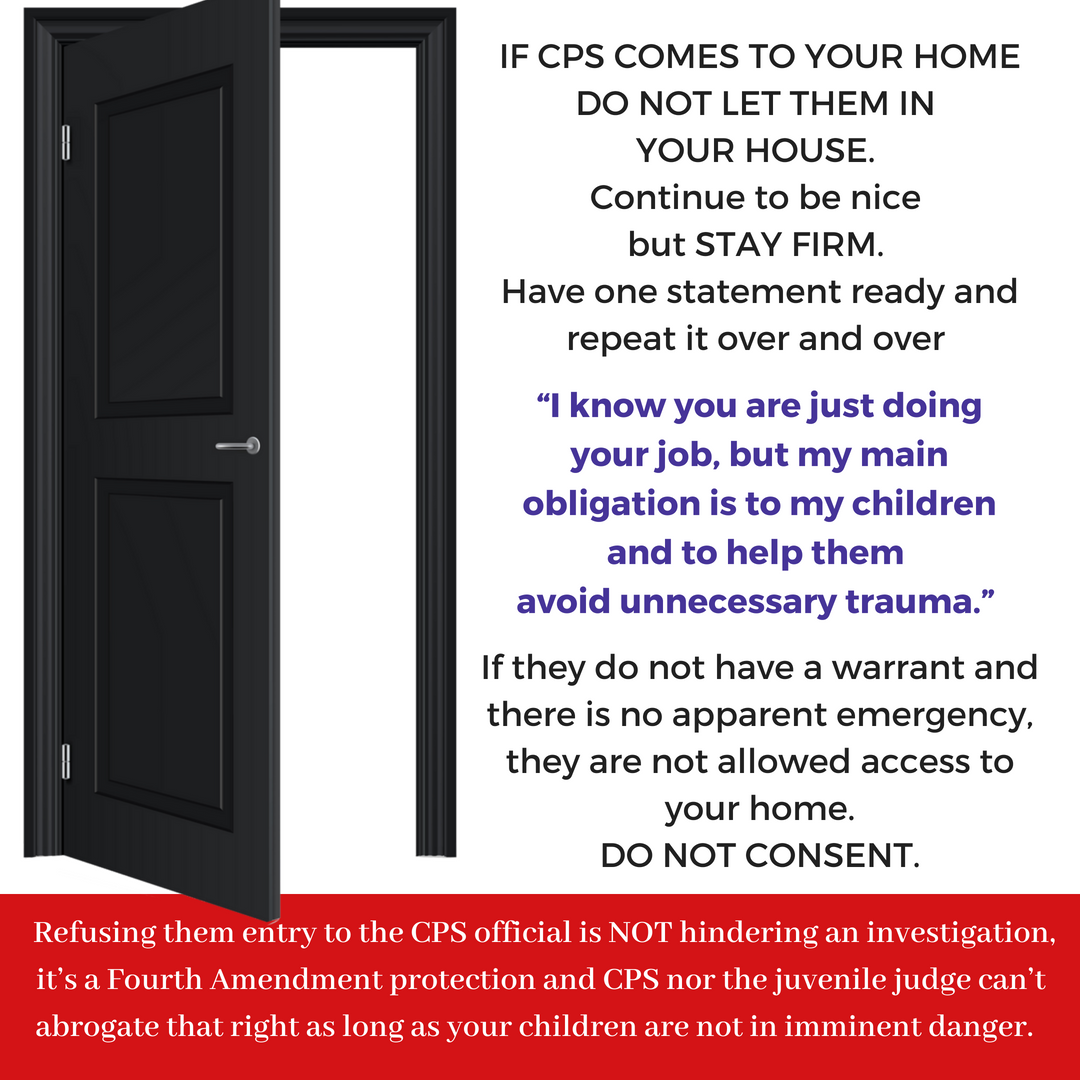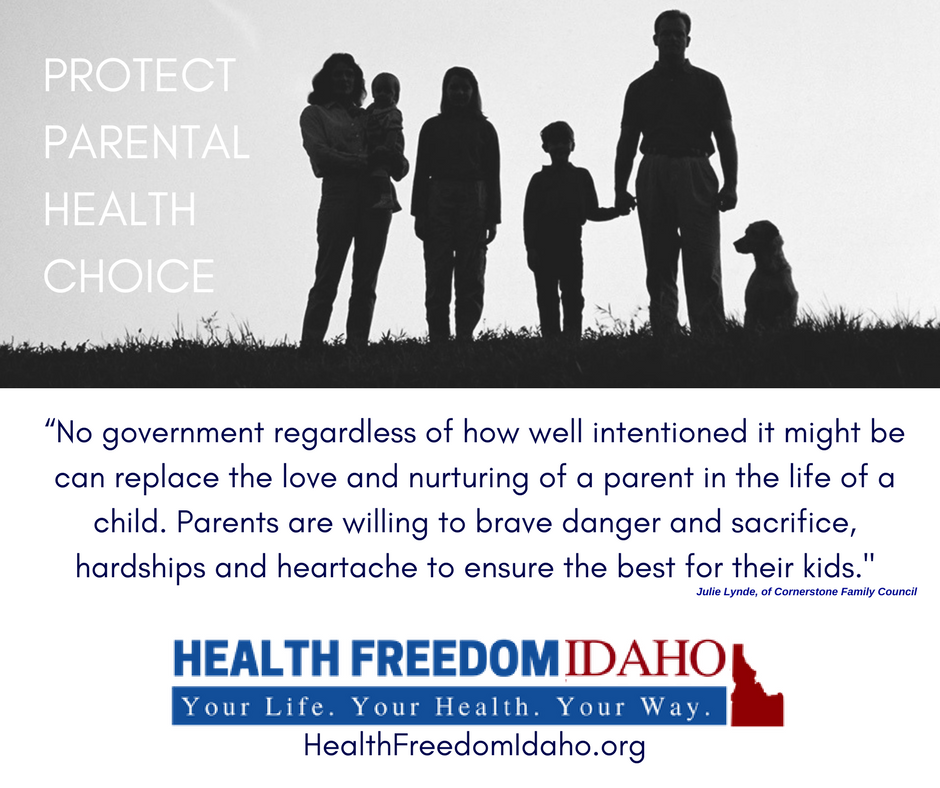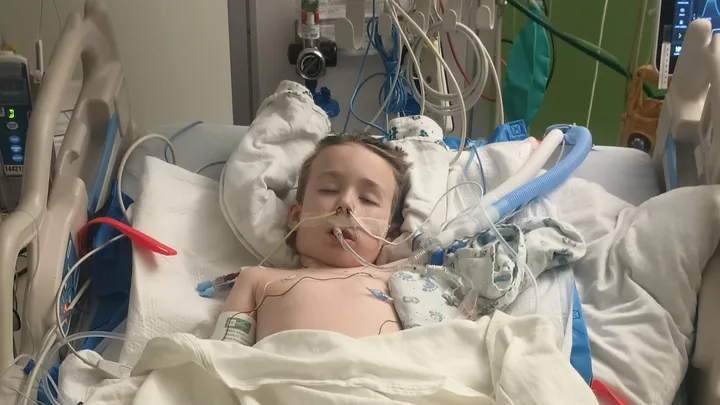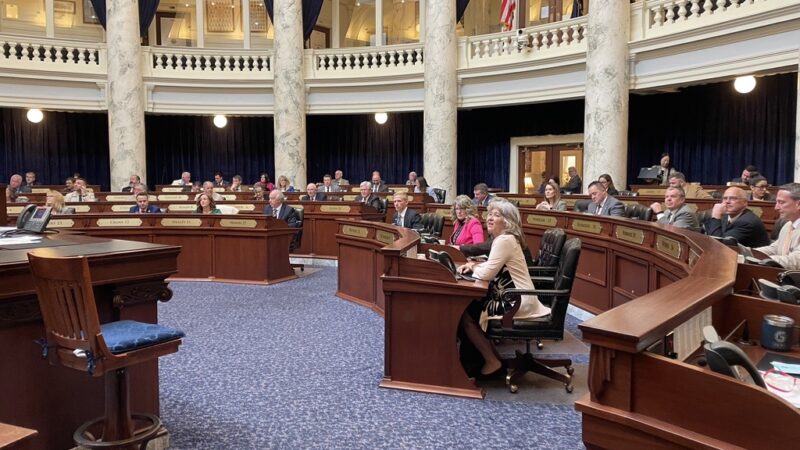Protect Your Parental Rights When CPS Investigates

There’s nothing quite like the adrenaline rush and flood of shame that hits when you open the door to find someone from Child Protective Services (CPS) on your doorstep. It’s horrifying. It’s embarrassing. You immediately start to remember every CPS horror story you’ve ever heard and you begin to worry. Since more parents are experiencing a visit from CPS than ever before, and since sometimes those visits have resulted in the quick removal of children – despite no grounds to allegations of harm or abuse – it is critically important for every parent to have a good idea of how to respond to a CPS visit.
Parents have been ‘reported’ to CPS for some reasons that have nothing to do with neglect or abuse:
- Loving parents who refuse a recommended medical treatment for their child can be reported by a doctor who might fear losing his license to practice medicine.
- Neighbors or estranged family members may report a family despite the lack of grounds to support any allegations of abuse.
- Parents with a sick child seeking a second opinion have been reported to CPS by a hospital or medical authorities.
The fact of the matter is that over 80% of the calls that are called in to CPS are false and bogus. But CPS says, all calls have to be investigated. In Idaho statistics reveal that almost 80% of the children removed from their parents are returned to their parents. This calls into question the validity the government agency traumatizing the children and their parents with this forced separation, however that is a discussion for another post.
The reality is any visit by CPS should be taken VERY seriously.
The most significant mistakes made by parents are usually in the very first encounter. If you can understand how to handle the very first encounter with CPS, you can increase your chances of maintaining your family’s rights and freedom.
CPS will often seek to take a family by surprise. Be prepared.
- Be polite & SAY AS LITTLE AS POSSIBLE.
- Do NOT let them in your house. Continue to be nice but STAY FIRM.
- Ask permission to ask THEM questions. “I realize you are just doing your job. Would it be ok if I asked you a couple of questions?” Record the conversation. Investigator’s contact information. The supervisor’s contact information. Details of the allegations.
- Close the conversation telling them you will speak to your attorney and get back with them.
- Close the door.
Realize that closing the door will not close the investigation, but will allow you preserve your rights, gather your support and contact your attorney.
1. THE KEY: Be polite & SAY AS LITTLE AS POSSIBLE.
You might be terrified inside. You might be frightened and angry if you feel there is injustice going on, but the number one thing you can do is stay calm and be polite. Anything you say can be twisted. Do NOT DEFEND YOURSELF and do NOT volunteer information.
Most CPS referrals are very vague. They only know what was reported to them and usually, that information is not very specific. If you jump in and defend yourself, anything you say could be used against you later.
Once a CPS investigation has begun, they will investigate every aspect of your family. (Take a look at the CPS manual – the social worker doing the investigation is suppose to ‘know’ the answers to questions that involve parental self esteem, job security, discipline practices…) Even if the allegations against you are false, they will be paying attention to other items of concern and can begin investigating other allegations based on their findings.
The best defense? A closed mouth.
2. Do NOT let them in your house.
Continue to be nice but STAY FIRM. Have one statement ready and repeat it over and over “I know you are just doing your job, but my main obligation is to my children and to help them avoid unnecessary trauma.” If they do not have a warrant and there is no apparent emergency, they are not allowed access to your home. If a police officer is with them, they all know it is illegal to enter a home unless you CONSENT, or unless they have a warrant, or can hear an emergency situation going on.
DO NOT CONSENT.

Do not even open the door to allow the CPS agent look into your home to see your children: they can see something that creates an “emergency situation” even if it is not true.
Be FIRM. You should not waiver nor give in to thinking: “What’s the harm?” There is no compromise here: no exception. If you invite a CPS investigator social worker into your home, you have just waived your Federally-protected fourth amendment constitutional protection.
3. Ask permission to ask THEM questions.
“I realize you are just doing your job. Would it be ok if I asked you a couple of questions?”
Record the conversation. Idaho recording laws: At least one party must give consent in order to record an in-person conversation. Idaho Code Ann. § 18-6702.> If you need to get your cell phone, close the door and say, “I need to get something.”
- 1. Get a copy of their ID.
- 2. Supervisor Information. What are the name and phone number of your supervisors?
- 3. “What are the exact allegations that have been made against me? Federal law requires that I should be informed of any allegations against me.” If they say something vague, like “child abuse” or “environmental neglect,” demand specific answers. You have the legal right to this information!
- 4. Ask them if they have a warrant. Be direct. “Do you have a warrant to search my home or speak to my children?” If they produce a warrant make sure it is signed by a judge and dated. Ask for time to review the warrant. Read it over thoroughly. Tell them you want your attorney to review the warrant.
Without a warrant, they must gain your consent to enter your home or speak to your children. They are doing their job. Their supervisor has instructed them to make this visit and they will use whatever tactic they feel will be effective to GET MORE INFORMATION AGAINST YOU. They may alternate between: trying to be nice, being firm, threatening or trying to bargain with you. Stay immune to every tactic. Be Nice, but know your rights. Do not get caught up in their games. Don’t engage them in any discussion, except on the questions above.
If either CPS or police try to enter your home, ask what the emergency is and inform them you will be video recording once they enter the home. Without a warrant, they cannot take your children unless they feel they are in imminent danger.
Idaho Code section regarding imminent danger: §16-1608(1)(a). A declaration of imminent danger can be made “only where the child is endangered in his surroundings and prompt removal is necessary to prevent serious physical or mental injury to the child or where the child is an abandoned child . . .”https://isc.idaho.gov/cp/manual/Idaho_CP_Manual-3rd_Edition.pdf
If the police do force themselves into your home, do not physically resist. Allow them in, state that you object to their violation of your rights and state that you wish to have an attorney present. These statements may assist you in a later court hearing.
4. Worried you might look ‘guilty’ by not letting them in?
The close the conversation with this: “I’d like to have this conversation with you after I have had a chance to speak to my attorney. Is this the number you can be reached to schedule a time for that conversation?” Then simply close the door.
Once the door is closed take a deep breath, hug your kids tight and begin to prepare in defense of your family.
The minute you become aware that your family is being investigated, YOU MUST find an attorney who has experience in fighting CPS.
Juvenile Dependency courts are worlds unto themselves. Your most seasoned and experienced lawyers when first stepping foot into a Juvenile Dependency courtroom are totally dumb struct. Most lawyers –even experienced Family Law attorneys– who are not experienced with CPS mistakenly think that it is their job (as it would be in any other court setting) to find out what CPS wants and then communicate all the details to their clients. Shockingly, doing exactly that often leads to total disaster and the loss of your children.
If you are accused of physical abuse, immediately have your doctor give your child a thorough physical exam.
Ask your doctor to write a letter stating that there are no bruises or injuries observed, nor any other health-related issues that would raise any concern or suspicion of child abuse or neglect. Obviously, go to a doctor whom you trust. If a CPS or DCFS social worker suggests a doctor for you or suggests that they know where you can see a doctor at NO CHARGE (as attractive as that may be), NEVER visit with a doctor recommended by CPS. What you may not know is that these doctors are a regular part of the CPS system and they are commonly called as expert-testimony witnesses by CPS as a witness against the parents.
Create a list of relatives and friends who are willing and able to care for your children if CPS takes them.
If your children are removed from your home, or the court is demanding that your children must soon leave your home for some period of time it is always better that your children are taken in by relatives or friends. Having your kids in foster care is simply adding one more level of stress and complexity to your plate.

RESOURCES FOR YOU:
Idaho Parents CPS Manual: https://isc.idaho.gov/cp/manual/Idaho_CP_Manual-3rd_Edition.pdf
Corruption in CPS: https://www.liftingtheveil.org/reports2.htm
YOUR RIGHTS: IT’S UNCONSTITUTIONAL FOR CPS TO CONDUCT AN INVESTIGATION AND INTERVIEW A CHILD ON PRIVATE PROPERTY WITHOUT EXIGENT CIRCUMSTANCES OR PROBABLE CAUSE.
The decision in the case of Doe et al, v. Heck et al (No. 01-3648, 2003 US App. Lexis 7144) will affect the manner in which law enforcement and child protective services investigations of alleged child abuse or neglect are conducted. The decision of the 7th Circuit Court of Appeals found that this practice, i.e. the “no prior consent” interview of a child, will ordinarily constitute a “clear violation” of the constitutional rights of parents under the 4th and 14th Amendments to the U.S. Constitution. According to the Court, the investigative interview of a child constitutes a “search and seizure” and, when conducted on private property without “consent, a warrant, probable cause, or exigent circumstances,” such an interview is an unreasonable search and seizure in violation of the rights of the parent, child, and, possibly the owner of the private property.
The mere possibility of danger does not constitute an emergency or exigent circumstance that would justify a forced warrantless entry and a warrantless seizure of a child. Hurlman v. Rice, (2nd Cir. 1991) A due-process violation occurs when a state-required breakup of a natural family is founded solely on a “best interests” analysis that is not supported by the requisite proof of parental unfitness. Quilloin v. Walcott, 434 U.S. 246, 255, (1978)
http://www.parentsinaction.net/english/Legal/KnowYourFamilyRights.htm
CPS does not have a legal right to conduct an investigation of alleged child abuse or neglect in a private home without your consent. In fact, removing a child from your home without your consent even for several hours is a “seizure” under federal law. Speaking to your children without your consent is also a “seizure” under the law. If CPS cannot support a warrant and show that the child is in imminent danger along with probable cause, CPS cannot enter your home and speak with your children. Remember, anonymous calls into CPS are NEVER probable cause under the Warrant Clause. And even if they got a name and number from the reporter on the end of the phone, that also does not support probable cause under the law. CPS must by law, investigate the caller to determine to see if he or she is the person who they say they are and that what they said is credible. The call alone, standing by itself, is insufficient to support probable cause under the law. Many bogus calls are made by disgruntle neighbors, ex spouses, someone wanting to get revenge so CPS needs to show due diligence as do police to get sworn statements.
ACCESSING YOUR CHILD’S RECORD
Your children’s records are protected by FERPA and HIPAA regarding your children’s educational and medical records. They need a lawful warrant like the police under the “warrant clause” in order to seize any records. If your child school records contain medical records, then HIPAA also applies. When the school or doctor sends records to CPS or allows them to view them without your permission, both the sender and receiver violated the law.
http://www.parentsinaction.net/english/Legal/KnowYourFamilyRights.htm






